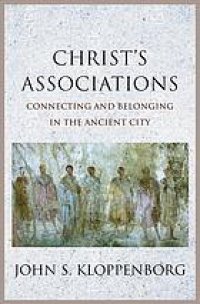A groundbreaking investigation of early Christ groups in the ancient Mediterranean that reshapes the perception of Christian associations in the first three centuries of the Common Era. As an urban movement, the early groups of Christ-followers came into contact with the many small groups in Greek and Roman antiquity. Organized around the workplace, a deity, a diasporic identity, or a neighborhood, these associations gathered in small face-to-face meetings and provided the principal context for cultic and social interactions for their members. Unlike most other groups, however, about which we have data on their rules of membership, financial management, and organizational hierarchy, we have very little information about early Christ groups. Drawing on data about associative practices throughout the ancient world, this innovative study offers new insight into the structure and mission of the early Christian groups. John S. Kloppenborg situates the Christian associations within the broader historical context of the ancient Mediterranean and reveals that they were probably smaller than previously believed and did not have a uniform system of governance, and that the attraction of Christian groups was based more on practice than theological belief. Read more...
